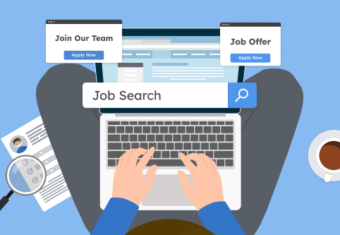If you want a high-paying career that won’t be replaced by AI, it’s crucial to understand which professions are growing the fastest — these indispensable jobs aren’t likely to be automated.
Whether or not you’re planning a career change, this ranking of the 15 fastest-growing, highest-paying jobs is a reminder that many human skills can’t be replaced.
Note: This page is regularly updated to include new data and best reflect current hiring trends. We outline our methodology and provide some context about who we are at the end of the report, along with our thoughts on how to stay “AI-proof” in the evolving job market.
By the numbers: the fastest-growing, highest-paying jobs
The table below ranks the 15 fastest-growing U.S. professions, according to the Bureau of Labor Statistics (BLS), that pay above the median annual U.S. salary ($59,540).
The BLS estimates that the U.S. economy will add approximately 4.7 million jobs from 2022 to 2032.
The 15 fastest-growing, highest-paying jobs in the U.S.
(2022–2032) | (2022) |
|
|---|---|---|
| Nurse practitioners | ||
| Data scientists | ||
| Statisticians | ||
| Information security analysts | ||
| Medical and health services managers | ||
| Epidemiologists | ||
| Physician assistants | ||
| Physical therapist assistants | ||
| Software developers | ||
| Occupational therapy assistants | ||
| Actuaries | ||
| Computer and information research scientists | ||
| Operations research analysts | ||
| Software quality assurance analysts and testers | ||
| Veterinarians |
1. Nurse practitioners
Key Stats
Job growth (2022 – 2032): 44.5%
Projected new jobs (2022 – 2032): 118,600
Median salary: $121,610
Educational requirements/certifications: Registered Nurse (RN) license, Bachelor of Science in Nursing (BSN), nurse practitioner Master’s or Doctoral program, national board certification
Key skills: Compassion, detail-oriented, leadership, critical thinking
Advancement opportunities: Clinical specialization, administrative roles, healthcare management
Why they’re AI-proof: Nurse practitioners have a minimal risk of being automated due to this job’s need for complex problem-solving, creativity, and strong interpersonal skills. These roles also involve intricate hand movements and precise coordination, which are difficult for machines to replicate. Technologies such as AI enhance patient care and data collection, but don’t replace the need for advanced practice nurses.
2. Data scientists
Key Stats
Job growth (2022 – 2032): 35.2%
Projected new jobs (2022 – 2032): 59,400
Median salary: $103,500
Educational requirements/certifications: Bachelor’s degree in computer science, statistics, mathematics, or related field; knowledge of programming languages such as Python or R
Key skills: Analytical skills, computer science, statistical skills, machine learning
Advancement opportunities: Senior data scientist, data science manager
Why they’re AI-proof: Data science roles are resistant to automation because they require complex problem-solving and high-level decision-making. Automation in data science aims to augment human capabilities rather than replace jobs, allowing employees to focus on more strategic and creative aspects of their roles. AI and machine learning will shape this field, but critical thinking, interpersonal communication, and ethical judgment can’t be replaced.
3. Statisticians
Key Stats
Job growth (2022 – 2032): 31.6%
Projected new jobs (2022 – 2032): 10,600
Median salary: $98,920
Educational requirements/certifications: Bachelor’s degree in statistics or mathematics; advanced degrees for higher positions; Accredited Professional Statistician (PStat, GStat), SAS Certified Statistical Business Analyst
Key skills: Analytical skills, mathematical skills, problem-solving, statistical software knowledge
Advancement opportunities: Senior statistician, statistical team leader
Why they’re AI-proof: Statisticians’ work involves a truly creative process that can’t be fully automated. Their role requires designing studies, cleaning up “dirty” data, and interpreting results in context, which involves real-world knowledge and judgment beyond what current AI can replicate. While AI tools will automate some tasks, they won’t likely replace the complex problem-solving or strategic thinking of human statistical experts.
4. Information security analysts
Key Stats
Job growth (2022 – 2032): 31.5%
Projected new jobs (2022 – 2032): 53,200
Median salary: $112,000
Educational requirements/certifications: Bachelor’s degree in computer science, information assurance, or related; Certified Information Systems Security Professional (CISSP) or Certified Information Security Manager (CISM)
Key skills: Analytical skills, detail-oriented, problem-solving, IT knowledge
Advancement opportunities: Chief security officer, IT project manager
Why they’re AI-proof: While there’s a moderate risk of automation for the professionals, information security analysts are critical for tasks that require human judgment and interaction, such as planning, implementing, upgrading, and monitoring security measures for the protection of computer networks and information. Evolving cyber threats will ensure a steady demand for human information security analysts.
5. Medical and health services managers
Key Stats
Job growth (2022 – 2032): 28.4%
Projected new jobs (2022 – 2032): 144,700
Median salary: $104,830
Educational requirements/certifications: Bachelor’s or Master’s degree in health administration
Key skills: Leadership, communication, problem-solving, technical skills
Advancement opportunities: Hospital administrator, healthcare executive
Why they’re AI-proof: These roles involve judgment, management, and interpersonal skills that experts agree can’t be automated. Medical and health services managers must constantly adapt to changing job requirements, which often include a mix of soft skills, process skills, and specific technical expertise. While technology may support better patient outcomes, AI can’t replace the strong interpersonal skills, ethics, and physical dexterity required for these jobs.
6. Epidemiologists
Key Stats
Job growth (2022 – 2032): 26.7%
Projected new jobs (2022 – 2032): 2,700
Median salary: $78,520
Educational requirements/certifications: Master’s degree in public health (MPH) or a related field; PhD for research positions
Key skills: Critical thinking, detail-oriented, analytical skills, communication
Advancement opportunities: Senior epidemiologist, public health director
Why they’re AI-proof: Epidemiologists require a deep understanding of disease patterns and health outcomes that involve complex data analysis and interpretation. Research shows that AI tools increase the power of epidemiological research, but these professionals require a level of human judgment and ethical consideration that AI can’t replicate.
7. Physician assistants
Key Stats
Job growth (2022 – 2032): 26.5%
Projected new jobs (2022 – 2032): 39,300
Median salary: $126,010
Educational requirements/certifications: Master’s degree from an accredited physician assistant program; pass the Physician Assistant National Certifying Examination (PANCE)
Key skills: Compassion, problem-solving, detail-oriented, communication
Advancement opportunities: Specialization, medical director
Why they’re AI-proof: Similar to nurse practitioners, physician assistants perform diagnostic and therapeutic procedures that require high levels of manual dexterity, complex problem-solving, and interpersonal skills. According to McKinsey & Company, healthcare is one of the sectors with the lowest overall potential for replacement by AI — only 35% of a practitioner’s time can be automated. Technology supports and expands diagnostic and treatment capabilities, but can’t replace the role of a human healthcare provider.
8. Physical therapist assistants
Key Stats
Job growth (2022 – 2032): 26.1%
Projected new jobs (2022 – 2032): 26,300
Median salary: $62,770
Educational requirements/certifications: Associate degree from an accredited program; state licensure
Key skills: Compassion, physical stamina, detail-oriented, interpersonal skills
Advancement opportunities: Physical therapist, healthcare administrator
Why they’re AI-proof: These professionals assist physical therapists in providing treatments that improve patient mobility, relieve pain, and prevent or limit permanent physical disabilities. The hands-on nature of the work, as well as the need for personal interaction with patients, make it resistant to automation. AI diagnostic tools may enhance treatment options in the future, but won’t replace the need for assistants.
9. Software developers
Key Stats
Job growth (2022 – 2032): 25.7%
Projected new jobs (2022 – 2032): 410,400
Median salary: $127,260
Educational requirements/certifications: Bachelor’s degree in computer science or related field; certifications in specific programming languages or technologies
Key skills: Computer programming (C/C++, Javascript, Java, Python, Ruby, etc.), problem-solving, analytical skills, creativity
Advancement opportunities: Senior developer, software architect, IT project manager
Why they’re AI-proof: In its first year of integration into software development, AI was met with a mix of enthusiasm, skepticism, and caution. The reason for this is that, unlike previous waves of industrial automation, AI is seemingly coming after jobs among higher-skilled, well-paid, and older workers.
Nonetheless, software companies have steadily adopted AI for its ability to enhance efficiency and creativity — ultimately to gain market advantage. However, while many aspects of software development can be automated, the core tasks of designing and writing new software are complex and ultimately require human ingenuity.
10. Occupational therapy assistants
Key Stats
Job growth (2022 – 2032): 24.17%
Projected new jobs (2022 – 2032): 10,900
Median salary: $64,250
Educational requirements/certifications: Associate degree from an accredited occupational therapy assistant program; national certification and state licensure
Key skills: Compassion, flexibility, interpersonal skills, detail-oriented
Advancement opportunities: Occupational therapist, healthcare administrator
Why they’re AI-proof: Occupational therapy assistants work closely with occupational therapists to help patients develop, recover, and improve the physical skills needed for employment and daily life. This role requires a high degree of personal interaction and adaptability to each patient’s needs, making it resistant to automation. Advances in AI technology will support better and more efficient treatment, but simply won’t replace the need for human health practitioners.
11. Actuaries
Key Stats
Job growth (2022 – 2032): 23.2%
Projected new jobs (2022 – 2032): 7,000
Median salary: $113,990
Educational requirements/certifications: Bachelor’s degree in actuarial science, mathematics, or related field; passing actuarial exams
Key skills: Analytical skills, business knowledge, mathematical skills, problem-solving
Advancement opportunities: Senior actuary, actuarial director
Why they’re AI-proof: Actuaries analyze the financial costs of risk and uncertainty. They apply mathematics, statistics, and financial theory to forecast future events. This profession requires a deep understanding of business and economics, complex problem-solving, and communication skills. The consensus in this field is that software automates some calculations but not strategic decision-making. The most likely scenario is that actuaries themselves will continuously train AI to assist them in their work, but the technology itself will not replace them.
12. Computer and information research scientists
Key Stats
Job growth (2022 – 2032): 22.7%
Projected new jobs (2022 – 2032): 8,300
Median salary: $136,620
Educational requirements/certifications: Master’s degree in computer science or a related field; PhD for academic positions
Key skills: Analytical skills, creativity, critical thinking, programming skills (software development, data structures, algorithms, application programming interfaces (APIs), Git, etc.
Advancement opportunities: Senior research scientist, IT director
Why they’re AI-proof: These scientists invent and design new approaches to computing technology and find innovative uses for existing technology. Their work involves a high level of creativity, theoretical knowledge, and problem-solving that is beyond the current capabilities of AI, making this one of the most secure technical fields for the future.
13. Operations research analysts
Key Stats
Job growth (2022 – 2032): 24.7%
Projected new jobs (2022 – 2032): 24,700
Median salary: $85,720
Educational requirements/certifications: Bachelor’s degree in operations research, analytics, or related field; Master’s degree for higher positions
Key skills: Analytical skills, mathematical skills, problem-solving, communication
Advancement opportunities: Senior analyst, management consultant
Why they’re AI-proof: Operations research analysts use advanced mathematical and analytical methods to help organizations investigate complex issues, identify and solve problems, and make better decisions. AI and operations are therefore highly complementary fields. The complexity and variability of the problems they address make their roles difficult to automate. Software enhances analysis capabilities but doesn’t replace the need for creative problem-solving, critical thinking, and human intuition to interpret complex data and make strategic decisions.
14. Software quality assurance analysts and testers
Key Stats
Job growth (2022 – 2032): 20.3%
Projected new jobs (2022 – 2032): 40,800
Median salary: $99,620
Educational requirements/certifications: Bachelor’s degree; Certified Test Engineer (CSTE), Certified Software Quality Analyst (CSQA), Certified Associate in Software Testing (CAST), CMSQ (Certified Manager of Software Quality), and ISTQB (International Software Testing Qualifications Board)
Key skills: Maintaining bug databases, understanding systems, familiarity with test management and bug tracking tools, and knowledge of certain programming languages
Advancement opportunities: Test analyst, test automation engineer, test lead, test manager, or test consultant
Why they’re AI-proof: These professionals are responsible for ensuring that software operates as intended through meticulous testing and analysis. Their work requires a detailed understanding of both the software being tested and the potential ways it can fail, which involves critical thinking and creativity. AI is beneficial for automating testing processes and improving efficiency and accuracy, but AI is unlikely to completely replace the role of humans in exploratory testing and the ability to understand complex software interactions.
15. Veterinarians
Key Stats
Job growth (2022 – 2032): 19.7%
Projected new jobs (2022 – 2032): 17,700
Median salary: $103,260
Educational requirements/certifications: Doctor of Veterinary Medicine (DVM) degree, North American Veterinary Licensing Examination
Key skills: Hands-on experience with animals, animal biology, microbiology, animal nutrition, the ability to work under pressure
Advancement opportunities: Specialization through residency (e.g. livestock, equine, marine, or small animal veterinary medicine)
Why they’re AI-proof: Veterinarians diagnose, treat, and research medical conditions and diseases of pets, livestock, and other animals. This profession requires extensive knowledge of animal biology, a high degree of manual dexterity for surgeries,s, and interpersonal skills to communicate with animal owners, making it resistant to automation. AI may streamline diagnosis and treatment, but also comes with practical and ethical limitations, and for this reason can’t replace the complex problem-solving, interpersonal skills, decision-making, and manual dexterity humans bring to the field.
How to stay “AI-proof” in the job market
Experts agree that AI will create more jobs than it eliminates. At the same time, the ability to continuously adapt and develop new skills will be crucial to success in the job market of the future.
Career experts agree that professionals who not only excel in creativity, emotional intelligence, and problem-solving, but also take advantage of automation — leveraging AI’s efficiency, process optimization, and data-driven insights — will always be in high demand.
As the economy and its workforce continue to emerge from a global pandemic, there is a new landscape for businesses and employees to explore and adapt to. COVID-19 created a chance for professionals to change career paths and for organizations to innovate, therefore, creating a perfect formula for new opportunities.
Through a corporate lens, companies have emphasized focus on financial and operational leadership, meaning, [the] end-to-end process of product/service delivery. This includes positioning the company for economic stability and competitive advantages, which leads to increased visibility and profitability.
Information technology often works in tandem with strategy-focused roles, as they create, implement, and support online marketing applications and infrastructure, [while] capturing and analyzing customers’ interactions and engagement. Data is crucial for a company’s survival. Regardless of the industry, professionals excelling in productivity, efficiency, and optimization will continue to be in high demand.
Kate Zimmer, Kate Zimmer, SHRM-CP, PRC, CDR & Manager of Executive Recruiting, Discover Financial Services
Methodology
According to the Occupational Employment Projections published by the U.S. Bureau of Labor Statistics, each ranked occupation in our listing is forecasted to grow from 2022 to 2032. Percentage growth calculated comparing employment figures in 2022 and 2032 forecasts. These positions pay above the annual median salary in the U.S., according to the Weekly Earnings of Wage and Salary Workers published in the fourth quarter of 2023. Assuming full-time employment for 52 weeks of the calendar year, the annual median salary for salaried U.S. workers was $59,540 at the end of 2023.
About Resume Genius
Since 2009, Resume Genius has combined innovative technology with leading industry expertise to simplify the job hunt for people of all backgrounds and levels of experience.
Resume Genius’s easy-to-use resume builder and wide range of free career resources, including resume templates, cover letter samples, and resume writing guides, help job seekers find fulfilling work and reach their career goals. Resume Genius is led by a team of dedicated career advisors and HR experts and has been featured in The New York Times, Forbes, CNBC, and Business Insider.
For media inquiries, please contact us.
Sources
Check out these sources for more information on the role AI will play in these careers and the job market.
- Actuarial Review, “Four Futures for Actuaries in the Wake of AI”
- AI & Society, “Ethics of Using AI in Veterinary Medicine”
- American Association of Nurse Practitioners, “The Path to Becoming a Nurse Practitioner (NP)”
- Analytics Insight, “Ways in Which Big Data Automation is Changing Data Science”
- Brookings Institute, “How AI-Powered Software Development May Affect Labor Markets”
- Forbes, “AI’s Impact In Its First Year in Software Engineering”
- Forbes, “Cybersecurity Trends & Statistics for 2023; What You Need To Know”
- Forbes, “Will ChatGPT Put Data Analysts Out Of Work?”
- Future Healthcare Journal, “The Potential for Artificial Intelligence in Healthcare”
- Katalon, “AI in Quality Assurance: Shifting From Manual to Autonomous Testing”
- London School of Economics, “10 Tech Careers With The Most Job Security in 2023”
- McKinsey & Company, “Transforming Healthcare with AI: The Impact on the Workforce and Organizations”
- Nursing Health Science, “Technological Machines and Artificial Intelligence in Nursing Practice”
- OT Dude, “Is Artificial Intelligence (AI) Technology or Robot OTs A Threat to Occupational Therapy Jobs?”
- U.S. Bureau of Labor Statistics, “Usual Weekly Earnings Of Wage And Salary Workers Fourth Quarter 2023”
- U.S. Bureau of Labor Statistics, “Employment Projections — 2022−2032”
- U.S. Government Accountability Office, “Which Workers Are the Most Affected by Automation and What Could Help Them Get New Jobs?”
- VetRadar, “Automation in Veterinary Care: Streamlining Processes for Improved Patient Care”
- Yearbook of Medical Informatics, “Public Health and Epidemiology Informatics: Can Artificial Intelligence Help Future Global Challenges?”















